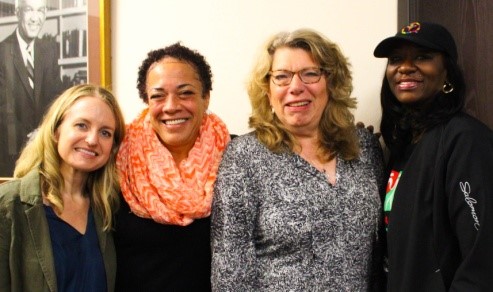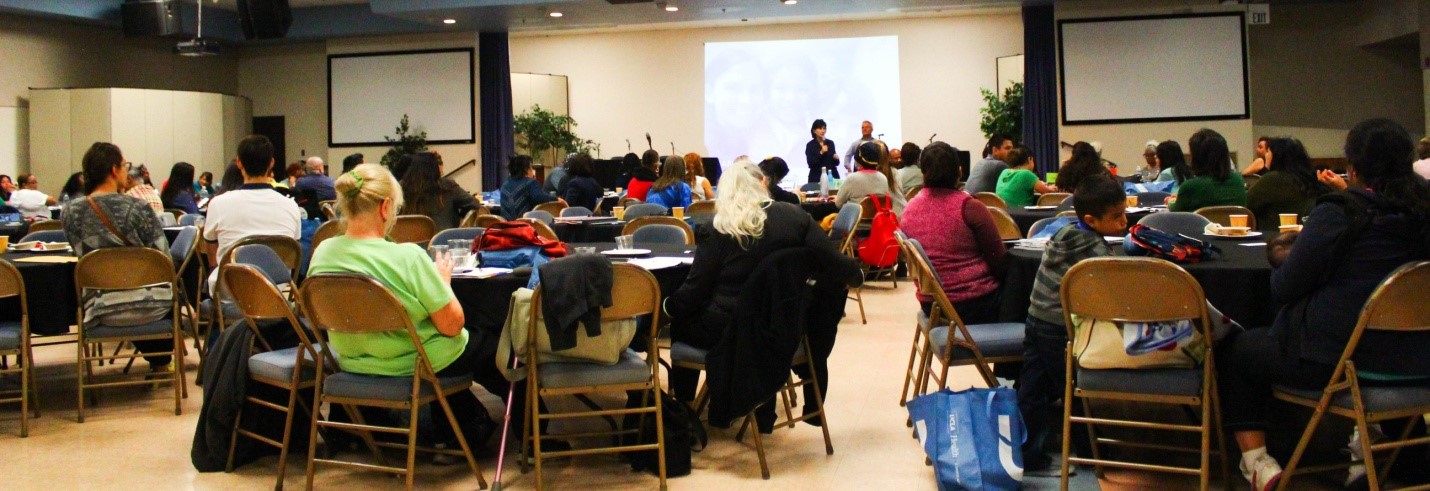AIR-B3 Leverages Community Collaborations to Improve Interventions for Under-Resourced Communities
April 11, 2017

|
The AIR-B3 network - UCLA, UC Davis, University of Pennsylvania, University of Rochester, and Drexel University - has continued to develop strong partnerships within our local communities. Understanding the importance of community collaboration to design effective interventions for under-resourced communities, the network continues to collaborate and disseminate information about autism through community conferences, community involvement, and direct participation in community organizations.
Each year, AIR-B3 hosts free community conferences for families and providers of autism services. In October 2016, University of Pennsylvania held a network community conference, Strengthening the Bond: Families Living with Autism in our Community, in the Free Library in Philadelphia. Investigators from all sites participated as expert speakers to an audience of families and providers in autism. In March 2017, UCLA continued with its 3rd community conference, Autism Spectrum Disorders: What We Need to Know. Growing our outreach capacity through partnerships with community-based agencies, the UCLA conference, with over 250 attendees, expanded translation services from Spanish only to Spanish and Korean. Lastly, the University of Rochester is gearing up for our next network conference, Skirboll Family Autism Conference, on June 10, 2017 at the Strong Museum.
![]()
 All smiles at the UCLA community conference, March 17th. L-R: Dr. Amanda Gulsrud, UCLA; Felica Jones, Healthy African American Families; Soryl Markowitz, Westside Regional Center; Pamela Colvin-Lee, South Central Los Angeles Regional Center.
All smiles at the UCLA community conference, March 17th. L-R: Dr. Amanda Gulsrud, UCLA; Felica Jones, Healthy African American Families; Soryl Markowitz, Westside Regional Center; Pamela Colvin-Lee, South Central Los Angeles Regional Center.
A breakout session on advocacy in the early years with Dr. Connie Kasari, UCLA, and Dr. Michael Regalado, Keck School of Medicine, University of Southern California.

![]()
In addition to our free community conferences, our network members maintain strong community relationships through their engagement and service on various committees and organizations for autism. Drs. Kasari and Gulsrud continue a strong partnership with LAUSD, serving on special committees and autism task forces and giving invited talks to parents and professionals. Through a monthly community workgroup of parents and professionals in autism, results from earlier phases of AIR-B3and new ideas for intervention development are regularly shared with community members in order to gain input and feedback that resonates with the local community. As a result of this dissemination, parents in the workgroup were empowered to partner with Healthy African American Families to meet an identified need for the local community - the creation of an autism parent support group for the South Los Angeles area.
Rochester investigator, Dr. Suzannah Iadarola, is the co-chair of the Parent Engagement Collaborative Action Network, which brings together several different parent engagement programs aimed at encouraging parents to obtain early intervention services for their children when needed and to improve school outcomes (http://roc.walkerwebservices.com/our-priorities/). Dr. Tristram Smith is part of a group called GROW-Rochester, which is aiming to screen three-year-olds in the city on their health and development (https://www.childrensinstitute.net/programs/grow-rochester/about).Drs. Iadarola and Smith have worked with the group to add an autism rating scale to the screening battery; the scale will start being used in July.
At UC Davis, over 30 community agencies, including schools, early intervention programs, family resource centers, health centers and developmental services programs participate in monthly meetings aimed at developing the AIR-B3 intervention strategies to engage low resource families in early service access and school transitions. Patricia Schetter leads that California Autism Professional Training and Information Network (CAPTAIN), a multiagency network developed to support the understanding and use of evidence-based practices for individuals with ASD acrossCalifornia (www.captain.ca.gov). Graduate student and parent, Elizabeth Morgan, co-leads the African American Developmental Disabilities Parent Advisory Group (AADDPA) which meets monthly to support the needs of families by providing advocacy and resources to increase awareness of developmental disabilities at the community level. Dr. Aubyn Stahmer is a member of the Help Me Grow (HMG) - Sacramento leadership team working to assist thecounty in identifying at-risk children and link families to community-based programs and services.
At Drexel University, Dr. McGhee Hassrick is developing systematic ways to track and support community-research collaboration across all AIR-B3 sites using the PARTNER Network Evaluation Framework (developed by Danielle Varda, funded by RWJ and utilized globally to support community change networks). The PARTNER approach will assess opportunities and gaps, systematically track perceptions among diverse stakeholders, track agreement among the overall network about the degree of progress toward established outcomes and track actual relationships among network members, so as to assess the interrelationships of the network.
At the University of Pennsylvania, Dr. Mandell's team holds monthly advisory board meetings with members from the School District of Philadelphia, local early intervention providers, The Center for Autism Research at CHOP and other family resource centers to discuss the feasibility of research implementation. The team attends local parent groups and monthly workshops at La Salle University's Autism and Development Disabilities Education Resources (LADDER) Center and SPIN (a local non-profit organization providing services to people of all ages with autism and other disabilities), and distributes a monthly email newsletter describing local autism resources and events to over 220 stakeholders. Dr. Mandell's team continues a strong partnership with the school district of Philadelphia, collaborating to improve educational supports for students with autism in public schools. Additionally, Dr. Mandell and Dr. Pellecchia (investigator) participate in monthly workgroups with representatives from systems that serve children with autism from birth through age 5 to develop a more unified system of care for young children with autism across the service systems. Drs. Mandell and Pellecchia have also been working with Philadelphia's Community Behavioral Health agencies to develop standards of care for agencies serving children with autism, including developing best practice parameters for the treatment and assessment of children with autism.
The AIR-B network is actively engaging the community, and we hope to increase our reach even further in the next several years.







